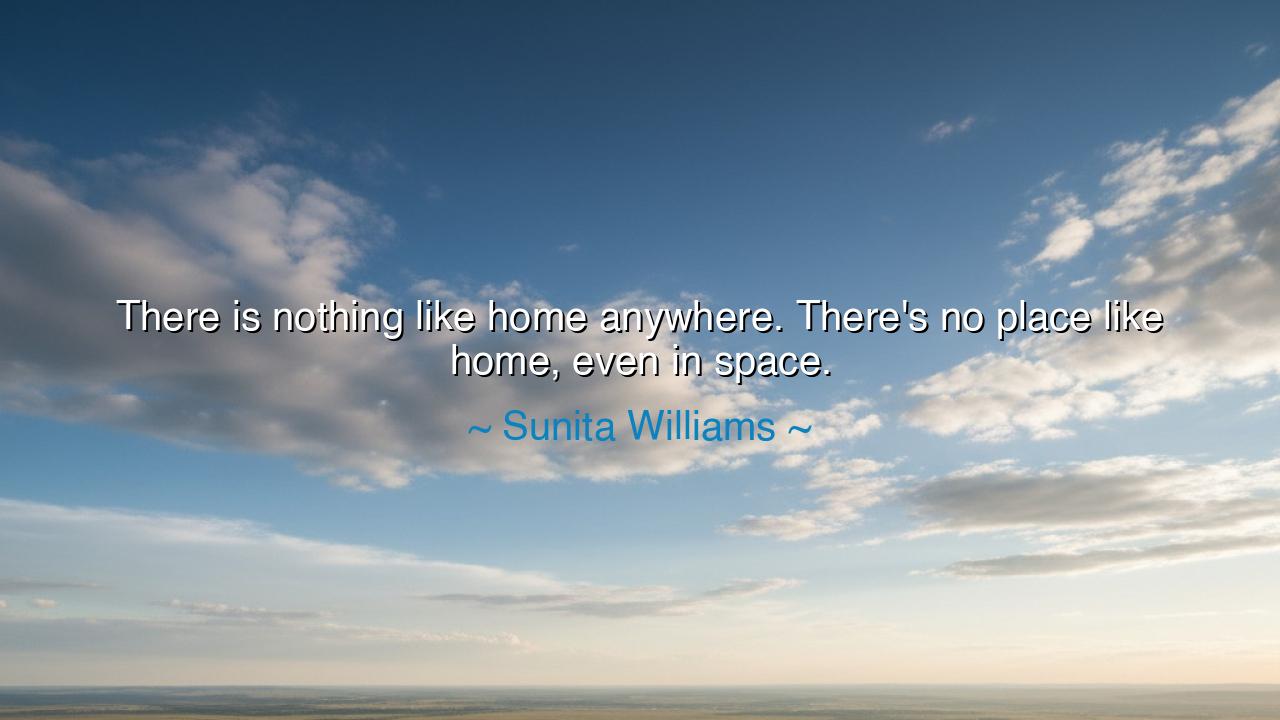
There is nothing like home anywhere. There's no place like home






In the words of Sunita Williams, “There is nothing like home anywhere. There's no place like home, even in space.” — there echoes a truth so ancient, so human, that even the silence of the stars cannot erase it. Spoken by one who has gazed upon the Earth from the infinite darkness beyond, these words are both humble and cosmic. They remind us that home is not merely a dwelling of walls and roofs, but the sacred center of belonging — the place where the heart remembers who it is. From the height of the heavens, where distance turns nations into shadows and oceans into veins of blue light, Sunita Williams discovered what sages have long known: that all journeys, no matter how far, lead us back to the yearning for home.
The ancients, too, spoke of this truth in their own way. Odysseus, after twenty years of war and wandering, turned his back on the glories of Troy and the temptations of immortal pleasure, longing only for the humble shores of Ithaca. Even when offered eternity by the nymph Calypso, he refused, saying that nothing — not even godhood — could replace the warmth of his mortal home. Sunita’s words echo that same wisdom. Though she floated in the celestial sea, witnessing the majesty of Earth’s curve and the eternal sunrise over the horizon of space, her heart remained tethered to the soil below. For the human spirit, no matter how advanced its machines or vast its reach, carries within it an unbreakable thread — the longing for belonging.
To say “There’s no place like home, even in space” is to affirm a truth about the soul itself. Home is not only a physical place; it is the place of origin — where memory, love, and identity intertwine. In the stillness of the cosmos, surrounded by silence deeper than any night, Williams felt the pulse of life that beats only on Earth: the laughter of children, the rustle of trees, the scent of rain. These small, earthly miracles are what make home sacred. In her words, the grandeur of the universe did not diminish the value of Earth — it magnified it. The further she traveled, the more she understood that the meaning of life is not in escape, but in return.
Her reflection holds another lesson, too — one about gratitude. When we live daily within our comforts, we often forget their worth. We take for granted the air we breathe, the ground beneath our feet, the faces of those we love. Yet from the vantage of space, Sunita saw the planet as a fragile oasis in an endless desert of stars. What the ancients once called “Gaia” or “Mother Earth” appeared before her as one living being, delicate yet resilient. Her realization, “There is nothing like home anywhere,” is a cry of reverence — a reminder that this blue world is not merely where we live, but what sustains our every breath.
Consider the ancient tale of Enkidu from the Epic of Gilgamesh. Created from the clay of the wild, he lived free among animals until he was brought to civilization. When he first entered the city, he felt the strangeness of walls and the noise of people, yet in time, he learned that home is not about where one begins, but where one’s heart finds purpose. So too, for Sunita Williams, “home” was not limited by geography. Whether on Earth or orbiting thousands of miles above it, home remained wherever love and humanity resided. Thus, her words become not merely about Earth as a planet, but about connection, identity, and meaning.
There is also an echo of humility in her statement. To explore the stars is the triumph of human intellect, but to cherish home is the triumph of the human heart. In an age when mankind reaches ever further outward — toward other planets, other galaxies — Sunita’s voice reminds us not to forget the roots that anchor us. As the ancients would say, “He who forgets his hearth forgets himself.” To lose the sense of home is to lose the compass of the soul. Every invention, every journey, every discovery must lead us not away from our humanity, but deeper into it.
So let her words be a teaching for all who wander — whether across lands or through the labyrinth of ambition. Remember the home that nurtured you, the people who gave you warmth, the earth that bore your first steps. Protect your home, both the one built of bricks and the one made of soil and sky. Let gratitude be your constant companion, for only by honoring what we have can we be worthy of what we seek.
In the end, when the stars grow silent and the Earth turns once more beneath our feet, we will know, as Sunita Williams knew, that there is nothing like home anywhere — not among the constellations, not beyond the veil of the heavens. For home is not just a place we return to; it is the origin of love itself, the eternal hearth of the human spirit.






AAdministratorAdministrator
Welcome, honored guests. Please leave a comment, we will respond soon